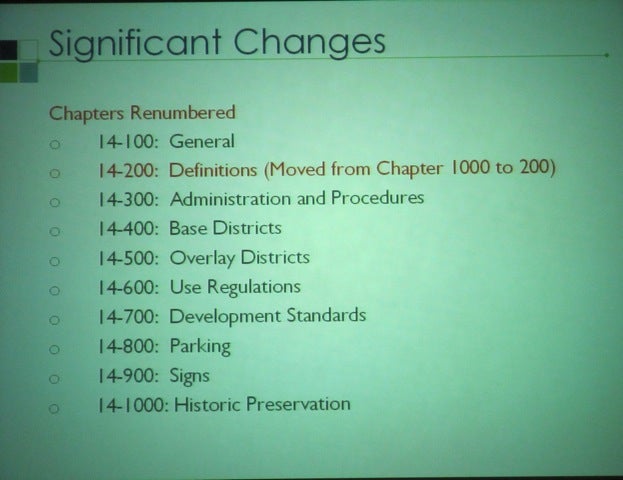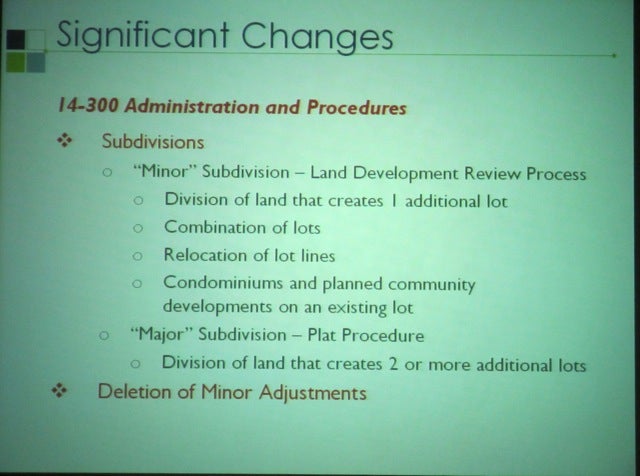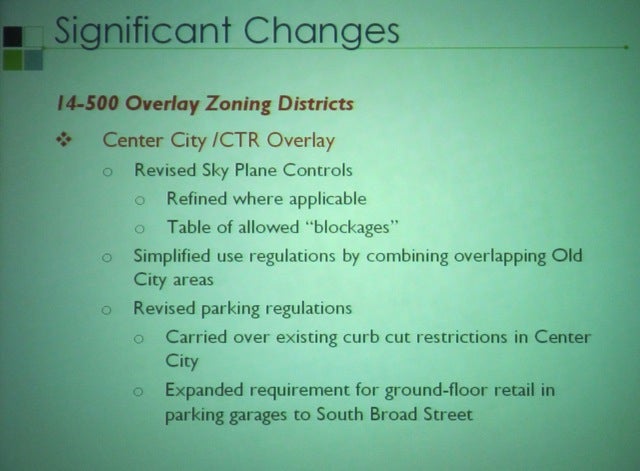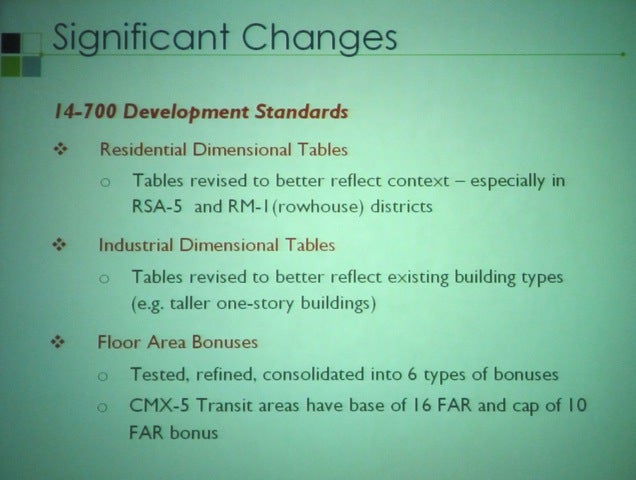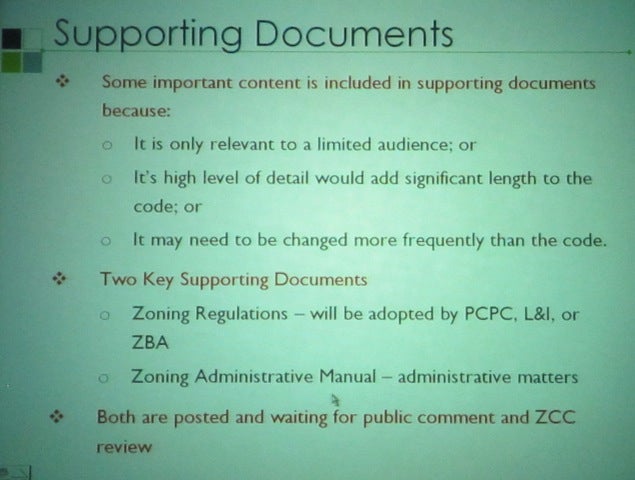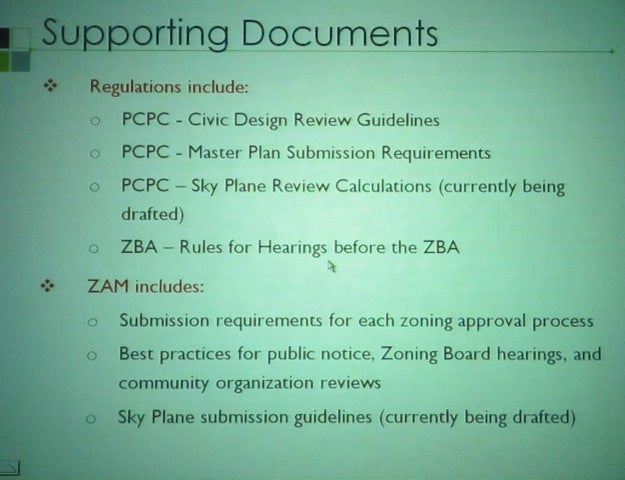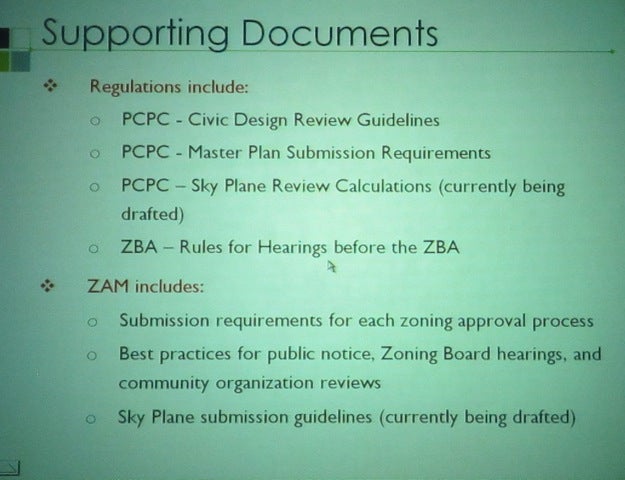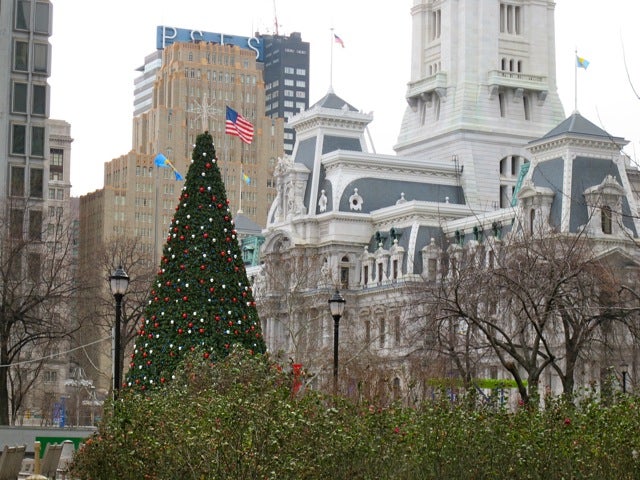ZCC Meeting: Red-line draft code open for comment; developers and civics push back on deadline
Too bad I already blew my David Bowie “Changes” joke two weeks ago. On Wednesday’s episode of the Zoning Code Commission: Al Taubenberger announced that he was resigning as commissioner to seek the Republican party nomination for an at-large City Council seat. Richard DeMarco resigned his seat and announced that he would be running for judge on the Court of Common Pleas. Lead consultant Don Elliott presented details of what’s called the “referral draft” of the zoning code, which, if all goes as planned, would be voted on next month. But many in the room objected to the timeline.
In the round of mutual thanks and appreciation, DeMarco said, referring to Taubenberger, “I may have to vote for a Republican this year.”
“I want to acknowledge that I’ll be supporting at least one Democrat,” Taubenberger replied.
Councilman Brian J. O’Neill jumped in to point out the promises of support were unequal.
“Hey, he only said ‘might!'” referring to DeMarco.
The levity, however, was limited to the introductory platitudes, and attention turned to the more serious work of trying to advance the referral draft of the code to City Council. ZCC’s vote to forward the referral draft to City Council is tentatively scheduled for January 26 at 8:00 a.m.
Alan Greenberger chaired Wednesday’s meeting. He said the ZCC will accept written comments on the referral draft through January 5, and will distribute them to commissioners and ZCC’s consultants. Because of the quick turnaround, Greenberger said the ZCC will not reply to comments, nor will it post them to zoningmatters.org.
One of ZCC’s mandates is to work on a plan for converting the old zoning districts to new ones, and how to go about some of the substantive remapping that will occur. According to Eva Gladstein, executive director of the ZCC, a draft plan has been completed with the help of Alan Urek from the planning commission. They’re working with the city’s technology division to figure out how to publish it without creating confusion with the extant zoning overlay map (http://citymaps.phila.gov/zoningoverlay/) that residents and developers currently use to figure out how properties are zoned.
Elliott’s presentation focused on changes the ZCC has made to the consolidated code draft since September, and on a handful of ongoing open issues.
Changes discussed included:
- Revising the civic design review timeline down from 75 working days to 60 calendar days.
- More details on the two-stage opt-in zoning permit process, by which property owners can clearly understand the broad swaths of what they’re permitted to build on their sites.
- Allowing for neighborhoods to opt out of permitting Accessory Dwelling Units in their districts.
- Further revising the dimensional tables for residential, industrial, and commercial buildings, including allowing increased floor area rations for buildings near the Market East, Suburban, and 30th Street Stations.
Issues Elliott identified as open included:
- “Minor subdivision standards,” which allow severing one lot into two, combining two lots into one, or minor moves of property lines. Because this was just introduced in the referral draft, the ZCC considers this to be open for discussion.
- Form and design, and landscaping and trees. Elliott said that whether these regulations were enforcable as zoning reulations may be a question, particularly when asking builders to specify items like the number of trees at the outset of a project, because project-specific issues may alter that number or their placement.
- Supporting documents. The Zoning Regulations and the Zoning Administrative Manual are available on zoningmatters.org, and they are open to ongoing public comment.
Discussion among the commissioners focused on whether the code sufficiently addressed the problem of variances. The referral draft removed a section giving L&I staff leeway to give over-the-counter approval to minor changes or variances and instead adjusts permitted building heights and setbacks to try to address the issue.
“When we initially discussed that, you had statistics about how many ZBA cases there are as a result of these minor teeny things that are clogging up the system. How does this impact those statistics in terms of making the process easier?”
“I recommend you track them over time,” Elliott replied. “If you’re still getting one-foot variances, you may need to adjust it.”
Councilman Brian J. O’Neill reiterated his concerns about use variances, and his concern that a greater number of uses are now permitted in residential areas.
“It seems like at least in the residential portion, there’s a whole lot of new uses that weren’t allowed before that are going to be allowed as a matter of right or as a special exception rather than a variance. People aren’t just going to ask how did this get here. Theyr’e going to want to know what the methodology was. Were there so many cases comeing to the zoning board for a particular thing, the were getting granted? In most of these cases, I haven’t seen them coming to the Zoning Board.”
Elliott replied that uses were reconceived as categories, because the current code’s frequent reliance upon permitting or prohibiting a large number of specific uses has made the code unwieldy. He suggested that, where necessary, council members identify uses that need special conditions, and identify them as such.
“Certainly there may be outliers that need to be addressed,” said Peter Kelsen, who chairs the ZCC’s work plan committee. “We’re not going anywhere.”
Commissioner John Westrum expressed his wish that a process be defined by which updates to the code may be made as problems come up, to minimize the need for a massive rewriting or amending process.
“I think we ought to be proposing an effective date for this code that is not the date that it gets approved, so that we have some period in between to see how this goes, do some education work, training at L&I, so developers and residents get used to it,” Greenberger replied.
“The second thing we probably ought to do: we may want to recommend to council, and to ourselves, that there be a mandated review of the code. I’m making up numbers here, after a two-year period to just see how it’s gone, and maybe in a single, organized way propose changes against things that we think aren’t working right,” he said.
Commissioner Emanual Kelly, Taubenberger, and Elliott all thought an effective date and a clear review would help give confidence to developers and the public to move forward.
“I think one of the most useful things you can do is to come up with a schedule,” Elliott said. “In order to walk off the plank you need to give people comfort that there’s a process in place where, when we find problems—which we will—before, at the time of adoption, and soon after adoption, that we are committed to fixes.”
Yet as things are coming down to the wire, the ZCC is getting some pushback on their timeline to advance the draft code into law.
Craig Schelter of Development Workshop and Steve Huntington of the Crosstown Coalition allied to oppose the January 5 deadline for comment. Huntington asked members of the coalition to stand, so the ZCC could see the swath of the city represented by their request; represented organizations included SCRUB, the Old City Civic Association, South of South Neighborhood Association, the Queen Village Neighbors Association, the Society Hill Civic Association, the Logan Square Neighborhood Association, and East Falls Community Council, and the South Broad Street Neighborhood Association. They deemed it too short a timeframe in which to provide feedback.
“I think you’ve really handed to any of us who have to read the entire code a stocking full of coal for the holidays,” Schelter said.
Greenberger threw the question to the Commission.
“You can argue for more time always. So the question is: What is the commission’s appetite for extension? This is the result of a lot of work you’ve put in, a lot of community meetings, a lot of meetings with developer groups, a lot of meetings with individuals. I don’t want an answer. I want you to be thinking about your appetite for slowing the process up,” Greenberg said.
L&I Commissioner Frances Burns asked Schelter how much additional time the Development Workshop and the Crosstown Coalition were seeking.
“At least 30 days beyond the [vote scheduled for the week of] January 24th,” Schelter said. “Looking at timeframe for remapping, the approach on that, these are big issues that affect the rest of the code. We’re not looking to have everything that we say incorporated. We’re not looking for an A-plus here. We’re looking to have an acceptable code that’s workable. This is much bigger than the development community, I think, ever expected it was going to be.”
Huntington said the January 5 deadline for comment was a problem for the civic organizations.
“If we have to respond before January 5, we’re just not going to respond,” Huntington said.
Councilman Green asked Huntington if he agreed with Schelter’s request for an additional 30 days, and Huntington said yes. Green then suggested he’d be open to an extension.
“I personally would like the benefit of having the Development Workshop, the civic groups, and other people to be able to submit by January 5, hopefully in writing, that we then have a chance to actually read and have a response from Don and others to this,” Green said.
“To me, 30 days after 3 years is not a big deal if we are giving everybody who is afraid of change the opportunity to have 30 days to respond. If that’s the request, personally I’d be in favor of giving everybody that time, including ourselves, so we have time to digest for what I’m sure will be voluminous and thoughtful comments.”
Greenberger said the Commission would discuss the matter and make a recommendation about the timeline shortly.
Contact the reporter at ngilewicz@planphilly.com
WHYY is your source for fact-based, in-depth journalism and information. As a nonprofit organization, we rely on financial support from readers like you. Please give today.





